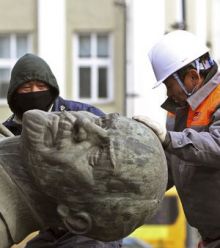We are unlikely to make a mistake saying that the image of Mongols and Mongolia is quite contradictory in the historical and cultural memory of the Ukrainian people who consider this country as a very remote and mysterious one. Some might recall the time of the Mongolian yoke and the Golden Horde, others might think of Taras Shevchenko’s sorrowful words, addressed to his pariah people: ‘This is how you study in foreign parts! Germans say: ‘You are Mongols. Mongols! Mongols! Miserable grandchildren of Golden Tamerlane.’ However, most people are likely to recall the recent Soviet time when there was exchange of delegations and economic cooperation as part of mainly flaunty international friendship. Now even that recent time are seen as in a fog, which does not prevent a lot of people from having a slightly superficial attitude to our former “little brothers” from the camp of the countries of developed socialism and a temptation to extrapolate this view to the modern time.
Instead, the other day the media reported about an event proving a sad fact that Mongolia is more progressive in the issue of its historical memory, as compared to Ukraine. I am speaking about the ceremony of dismantling the monument to Vladimir Lenin, constructed 58 years ago in the capital city of Mongolia Ulan Bator in sing of “eternal friendship” between communist countries, but in fact, as a part of the policy of spreading communism. The decision to dismantle the monument was made by the city mayor, member of the Democratic Party Bat-Uul Erden, who emphasized during the ceremony that under the rule of Lenin and Stalin thousands of Mongols were victims of political repressions. While the monument was being dismantled, people were throwing old shoes on it. The local authorities are going to construct a monument to victims of mass disorders in 2008 at that place. Previously the city authorities were going to sell the monument to Lenin at an auction. It is envisaged that its starting price will be about 280 dollars.
This event is directly related to the recent construction of the monument to Genghis Khan, the greatest figure in the history of the country. Modern Mongols are not that worried about excessive political correctness towards their neighboring countries, especially Russia, which was irritated a lot. However, it is clear that Ukrainians do not have any positive associations with the Great Khan. However, it is not the point now. When looking for examples of decolonization of countries’ historical memory and filling it with nationalist content, we usually address Europe, though similar processes are happening in Asia, where social and economic modernization does not lead to graded and cosmopolitan historical and national memory. Just the opposite. Unfortunately, we do not always see it in modern Europe where there are noticeable appeals to create some conflict-free and national-free space of European historical memory, where everyone should repent in front of everyone, the space of blurred distinctions between the good and the bad, objective and estranged attitude to historical events that actually marginalizes difficult historical events but does not cure them. These cosmopolitan views are thoughtlessly or deliberately spread on the post-genocide and post-colonial ground by some Ukrainian intellectuals. Some of them (Y. Hrytsak, A. Portnov) do not even mind having or restoring monuments to communist leaders and heroes in modern Ukraine, which obviously might become misleading for the Ukrainian youth and blur the national memory. I believe that if Ukrainians want to return to their identity, they have to realize the difference between theirs and strange, in particular, in their historical memory.
That is why one of the significant marks of our modern colonial status, of lagging behind not only non-communist and non-nationalist European countries but quickly developing Asian countries is the monument to Lenin in the center of Kyiv, who is much guiltier in front of the Ukrainian people than in front of Mongols; preservation or even restoration of monuments to the totalitarian leader in Ukrainian towns and villages, not to mention the shameful monument to Stalin in Zaporizhia. Not less shameful and demonstrative was the punishment of young Ukrainian heroes who had chosen the right way to liquidate this idol with their own hands. We do not have any moral right to call our country civilized and independent until on our God-given land there are communist non-Ukrainian idols guilty of numerous crimes against the Ukrainian people. However, we will be able to get rid of this mark of our backwardness and inferiority only when we overcome complexes in our souls through self-education, consolidation, successive struggle for our national identity and accessing to political power, necessary to realize the abovementioned goal.







